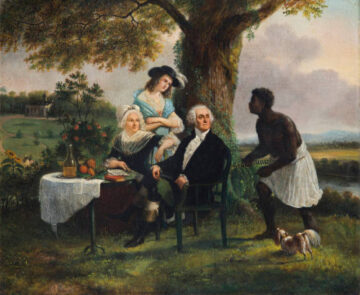by Michael Liss

George Washington and his wife Martha were committed eaters and generous hosts. A meal was a serious affair: fine China, glassware and cutlery, a variety of spirits, wines, and champagne, soups and souffles, trifles, crisps, tortes, any number of things pulled or plucked from the soil or vines, harvested from the bays and rivers, or trapped, shot, or simply domesticated and destined for the table.
The couple preferred English-style cooking and apparently were fond of meat pies. For a Christmas meal one year, their kitchen turned out a family favorite—a cover-the-bases delicacy that called for a bushel of flour for crust, stuffed with five different types of boiled fowl—pigeon, partridge, duck, goose, turkey—all baked on high heat for four hours. I’m not sure what that might be called—perhaps “pipparduckoosekey”?
Of course, none of these monumental affairs began with George and Martha doing any of that pulling, plucking, sowing, reaping, boiling, or broiling. Nor setting the table, clearing it afterwards, washing up, polishing the silver, drying the China, or putting it away. The Washingtons had “staff” for that, quite a large staff, in fact.

George and Martha kept slaves—per the Mount Vernon website, at the time of George’s death, there were 317 on the plantation. There is nothing to indicate Washington was a particularly difficult master, and Mount Vernon was in temperate Virginia, not some swampy, snake-and-insect-ridden killing field in South Carolina, but the “Peculiar Institution” was certainly vibrant enough there. As one might expect, the staff didn’t enjoy quite the same creature comforts as the Washingtons did. Again, from the website:
The standard slave quarter on Mount Vernon’s five farms was a rough one-room log structure with a wooden chimney, measuring about 225 square feet. Some dwellings were slightly larger and divided into two rooms, each housing a different family. As many as eight people could be crowded into a single room. They slept on pallets or on the dirt floor.
History is complex and contradictory, isn’t it? Certainly, one that demands you put inconvenient parts aside so as to appreciate the more celebratory. Still, this is George Washington, so let’s talk about the Father of Our Country’s personal qualities. No doubt he was uncommonly brave, an oak for the thin reed of independence to lash onto. He was incorruptible, rigidly self-disciplined, and, as Parson Weems reminds us, even as a boy, honest in trees and axes. Read more »


 April 2018: ‘Tis the Season of Giddiness in Democratlandia. Republicans are saddled with a widely despised President and riven by internal dissension. The Republican leadership in Congress is lurching from fiasco to fiasco – interrupted briefly by one great “success” on tax cuts. The zombie candidates of the Tea Party are still stalking establishment Republicans across the land. And, somewhere in his formidable fastness, the Great Dragon Mueller is winding up for the fiery breath that will consume the world of Trumpism like a paper lantern. And a Blue Wave – nay, a Tsunami – is headed towards the Republicans in Congress, looking to engulf them in November.
April 2018: ‘Tis the Season of Giddiness in Democratlandia. Republicans are saddled with a widely despised President and riven by internal dissension. The Republican leadership in Congress is lurching from fiasco to fiasco – interrupted briefly by one great “success” on tax cuts. The zombie candidates of the Tea Party are still stalking establishment Republicans across the land. And, somewhere in his formidable fastness, the Great Dragon Mueller is winding up for the fiery breath that will consume the world of Trumpism like a paper lantern. And a Blue Wave – nay, a Tsunami – is headed towards the Republicans in Congress, looking to engulf them in November.